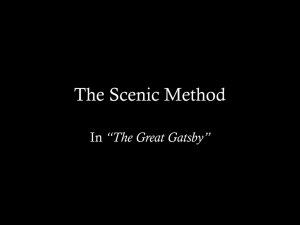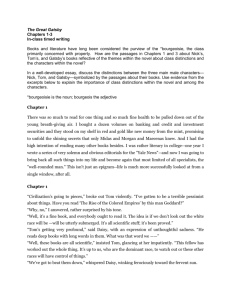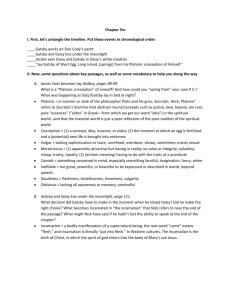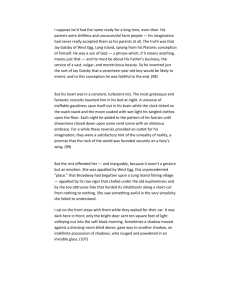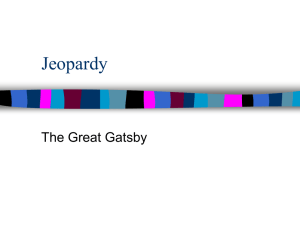Chapter 7 Note the use Fitzgerald makes of the weather as a
advertisement
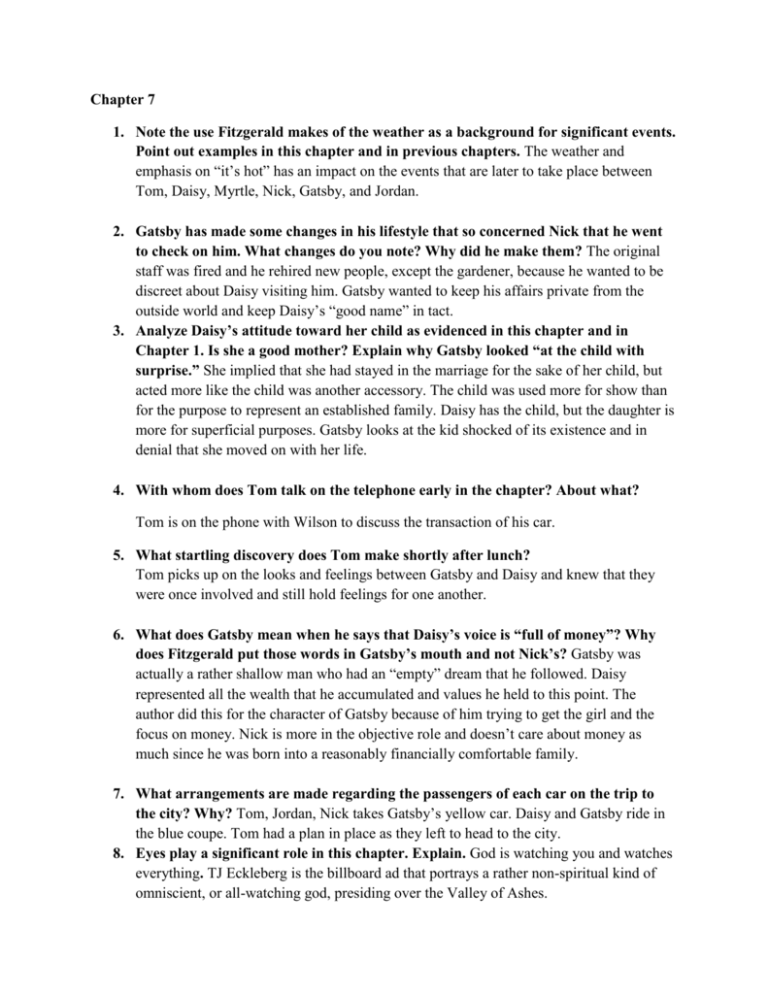
Chapter 7 1. Note the use Fitzgerald makes of the weather as a background for significant events. Point out examples in this chapter and in previous chapters. The weather and emphasis on “it’s hot” has an impact on the events that are later to take place between Tom, Daisy, Myrtle, Nick, Gatsby, and Jordan. 2. Gatsby has made some changes in his lifestyle that so concerned Nick that he went to check on him. What changes do you note? Why did he make them? The original staff was fired and he rehired new people, except the gardener, because he wanted to be discreet about Daisy visiting him. Gatsby wanted to keep his affairs private from the outside world and keep Daisy’s “good name” in tact. 3. Analyze Daisy’s attitude toward her child as evidenced in this chapter and in Chapter 1. Is she a good mother? Explain why Gatsby looked “at the child with surprise.” She implied that she had stayed in the marriage for the sake of her child, but acted more like the child was another accessory. The child was used more for show than for the purpose to represent an established family. Daisy has the child, but the daughter is more for superficial purposes. Gatsby looks at the kid shocked of its existence and in denial that she moved on with her life. 4. With whom does Tom talk on the telephone early in the chapter? About what? Tom is on the phone with Wilson to discuss the transaction of his car. 5. What startling discovery does Tom make shortly after lunch? Tom picks up on the looks and feelings between Gatsby and Daisy and knew that they were once involved and still hold feelings for one another. 6. What does Gatsby mean when he says that Daisy’s voice is “full of money”? Why does Fitzgerald put those words in Gatsby’s mouth and not Nick’s? Gatsby was actually a rather shallow man who had an “empty” dream that he followed. Daisy represented all the wealth that he accumulated and values he held to this point. The author did this for the character of Gatsby because of him trying to get the girl and the focus on money. Nick is more in the objective role and doesn’t care about money as much since he was born into a reasonably financially comfortable family. 7. What arrangements are made regarding the passengers of each car on the trip to the city? Why? Tom, Jordan, Nick takes Gatsby’s yellow car. Daisy and Gatsby ride in the blue coupe. Tom had a plan in place as they left to head to the city. 8. Eyes play a significant role in this chapter. Explain. God is watching you and watches everything. TJ Eckleberg is the billboard ad that portrays a rather non-spiritual kind of omniscient, or all-watching god, presiding over the Valley of Ashes. 9. Explain Nick’s statement paralleling Tom and Wilson. “. . . it occurred to me that there was no difference between men, in intelligence or race, so profound as the difference between the sick and the well.” Refer to the text and explain what prompted Nick to say this. Both men are surprised by the discovery that their wives are having affairs. George is physically affected by this knowledge, and looks pale, sick, and devastated. Tom is vengeful and “feeling the hot whips of panic”. He seems determined to keep Daisy at any cost. 10. What does Gatsby do that makes Nick want “to get up and slap him on the back”? Why does Nick feel this way? Gatsby explains how he attended Oxford as an officer’s privilege to attend any university in England or France after the Armistice. Gatsby explains that he had stayed for only five months, so he couldn’t really call himself an Oxford man. Thus, Tom’s attempt to discredit this aspect of Gatsby’s background story has failed. 11. Does Daisy know what love is? Whom does she really love? No. She says she loves Gatsby but cannot deny her love for Tom. This is an opinion answer, and you must cite evidence for support. 12. In what way is each of the main characters involved in the tragedy that occurs at the end of this chapter? (Write your own answers.) Gatsby: Daisy: Nick: Myrtle: Jordan: George: Tom: 13. Is there any significance in the fact that the day is Nick’s birthday? Nick sees his 30th birthday as a significant entrance into a world of “loneliness, a thinning list of single men to know, a thinning briefcase of enthusiasm, thinning hair.” It is significant that he had forgotten it until that moment. It is a rather negative view of what should be a happy event. 14. Why is it necessary for the author to introduce a new character, Michaelis, at this point in the novel? Michaelis, a neighbor, is a witness to the accident, and knew the Wilsons previously. He is astonished at the fact that George had been aggressive in locking his wife up upstairs, as it was uncharacteristic of George’s usual “colorless” demeanor. Wilson also seems to irrationally suspect that Michaelis might have been involved with Myrtle, as he asks him to account for his whereabouts at certain times. Michaelis appears to be a fairly objective observer who intends to check on George after the accident, but fails to do so. 15. Explain what Nick means when he says, “. . . suddenly I guessed at the truth”? Daisy was actually driving the death car, rather than Gatsby. 16. At the end of Chapter 7 Nick observes Gatsby, Tom, and Daisy after the accident. What conclusions does he reach? After observing Gatsby, Tom, and Daisy after the accident at the end of chapter 7 of the Great Gatsby, Nick comes to the conclusion that Daisy and Tom are conspiring at their table in a manner that is familiar to them, as they have created and escaped from such messes in the past. They were neither happy nor unhappy, and shared a “natural intimacy”(145). Gatsby continues to hold out hope by watching Daisy’s house in a “sacred vigil”. Nick is aware of the futility of Gatsby’s dream, but cannot persuade Gatsby to give up. 17. Explain the last paragraph of Chapter 7. Before the trip into the city and the accident, Gatsby was convinced that Daisy was in love with him and would without a doubt leave Tom for him. When he watches Daisy and Tom in the kitchen, the reality of the situation may be starting to hit him. Ever since he and Daisy fell apart when she married Tom, he has entirely devoted his life to acquiring wealth to impress Daisy and when her back. He has devoted his whole life and heart to this woman, and so as he watches her slipping away from him again, he knows nothing more than to return to his vigil over the woman that has controlled his life. Nick knows that Gatsby is “watching over nothing.” Despite evidence to the contrary, Gatsby is holding out for his dream.

